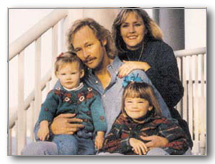Songs for Hard Times
- TERRY MATTINGLY
The powers that be made sure the Country Music Association Awards started with fireworks, red-white-and-blue streamers and star-spangled guitars. But it was Alan Jackson who stopped the show with a post-Sept. 11 anthem that had the faithful drying their eyes.
 |
The powers that be made sure the Country Music Association Awards started with fireworks, red-white-and-blue streamers and star-spangled guitars. But it was Alan Jackson who stopped the show with a post-Sept. 11 anthem that had the faithful drying their eyes.
"Where Were You (When the World Stopped Turning)" jumped from pangs of doubt to hugs in pews, from tuning out Hollywood trash to dusting off the family Bible.
The man in the white hat wrapped his grief and grit around a chorus that would turn an MTV programmer into a pillar of salt.
"I'm just a singer of simple songs. I'm not a real political man. I watch CNN, but I'm not really sure I can tell you the difference in Iraq and Iran," sang Jackson. "But I know Jesus and I talk to God and I remember this from when I was young. Faith, hope and love are some good things he gave us, and the greatest of these is love."
No one really needed to prove that real country music could handle hard times. After all, the year's hot song was a 1913 flashback that opens with the cry: "I am a man of constant sorrow, I have seen trouble all my days."
"Country music goes through cycles like everything else and we've seen lot of sanitized music in recent years," said Gene Edward Veith of Concordia University-Wisconsin, co-author of "Honky-Tonk Gospel."
"Right now the pendulum is swinging back toward the traditional side of things. That means we're hearing more music that one way or another says suffering is a part of real life. This is music about living and dying and joy and sorrow. When you start talking about things like that out in normal America, you have to use the language of faith."
Some people say traditional folk music kept the flame of old-time music alive, while others credit the late Bill Monroe and his bluegrass believers. There's blues, tin-pan jazz and English balladry in there, too. But most of all, said Veith, there is the gospel music that serves as a backdrop to everything else.
Country music is about people messing up and then trying to make things right sin and salvation. American popular culture knows how to handle the sin part, said Veith. But most of the people who rule Hollywood and the pop charts haven't got a clue about how to handle repentance, grace and salvation.
At its best, country music delivers both sides of this sobering equation.
"Christianity is not a matter of moralism or positive messages," wrote Veith and Thomas Wilmeth. "Rather, it is about the salvation of people who need salvation. Country music, unlike other popular art forms, has a way of acknowledging the sinfulness of sin. And though it sometimes goes too far in wallowing in that sin, at some point it has a way of acknowledging the power of the Gospel."
Country music does do its share of wallowing as well as worshiping. Anyone who has punched more than two jukebox buttons knows that country musicians have always had as much to say about Saturday night as Sunday morning. But even those "cheatin' and drinkin'" songs tend to reveal some moral roots, said Veith.
Many a barstool classic has included a big role for a real Satan who tempts real people with real sin that leads to a real hell. Also, country songs often portray alcohol as a futile way of dealing with moral failure. One thing this music almost never does is deny that the pain and brokenness is real. Meanwhile, it's hard to imagine many rock 'n' roll divas singing songs about adultery, because the institution of marriage is irrelevant in that context.
Country music isn't perfect, said Veith. Neither is real life.
Perhaps Johnny Cash put it best, when he described his taste in music: "I love songs about horses, railroads, land, judgment day, family, hard times, whiskey, courtship, marriage, adultery, separation, murder, war, prison, rambling, damnation, home, salvation, death, pride, humor, piety, rebellion, patriotism, larceny, determination, tragedy, rowdiness, heartbreak and love. And mother. And God."
That covers most of the big issues from Genesis to Revelation.
 This is Meaghen Gonzalez, Editor of CERC. I hope you appreciated this piece. We curate these articles especially for believers like you.
This is Meaghen Gonzalez, Editor of CERC. I hope you appreciated this piece. We curate these articles especially for believers like you.
Please show your appreciation by making a $3 donation. CERC is entirely reader supported.

Acknowledgement
Terry Mattingly. "Songs for Hard Times."
All columns are the sole property of the author. Reprinted with permission. Reproduction is prohibited.
The Author
Terry Mattingly writes the nationally syndicated "On Religion" column for the Scripps Howard News Service in Washington, D.C. He is the director and writes for Get Religion. He is also the director of the Washington Journalism Center at the Council for Christian Colleges and Universities. He is the author of the book "Pop Goes Religion: Faith in Popular Culture." In addition to his classroom duties, Mattingly lectures at Gordon-Conwell Theological Seminary in South Hamilton, Mass., the Torreys Honors Program at Biola University, the School of Journalism at the University of Nebraska at Lincoln, Baylor University in Waco, Texas, and in other settings across the nation. Terry Mattingly and his wife Debra have two children, Sarah Jeanne, and Frye Lewis. The Mattinglys are members of Holy Cross Orthodox Church in Linthicum, Md.
Copyright © 2001 Terry Mattingly



